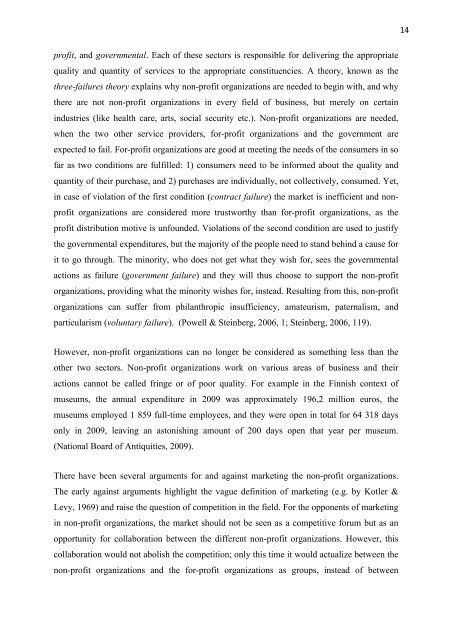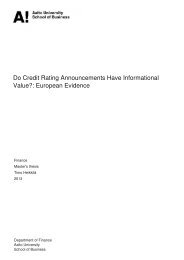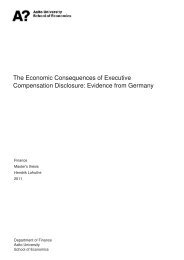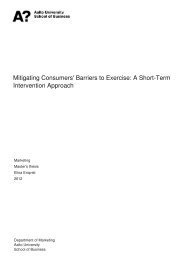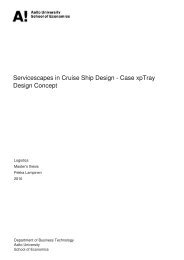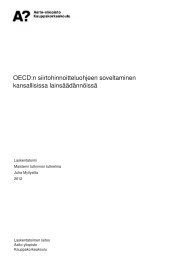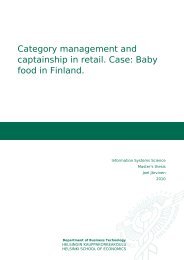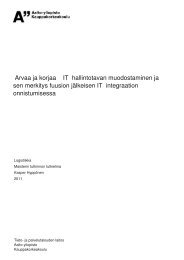Is there more to it than posting a status update?
Is there more to it than posting a status update?
Is there more to it than posting a status update?
Create successful ePaper yourself
Turn your PDF publications into a flip-book with our unique Google optimized e-Paper software.
prof<strong>it</strong>, and governmental. Each of these sec<strong>to</strong>rs is responsible for delivering the appropriate<br />
qual<strong>it</strong>y and quant<strong>it</strong>y of services <strong>to</strong> the appropriate const<strong>it</strong>uencies. A theory, known as the<br />
three-failures theory explains why non-prof<strong>it</strong> organizations are needed <strong>to</strong> begin w<strong>it</strong>h, and why<br />
<strong>there</strong> are not non-prof<strong>it</strong> organizations in every field of business, but merely on certain<br />
industries (like health care, arts, social secur<strong>it</strong>y etc.). Non-prof<strong>it</strong> organizations are needed,<br />
when the two other service providers, for-prof<strong>it</strong> organizations and the government are<br />
expected <strong>to</strong> fail. For-prof<strong>it</strong> organizations are good at meeting the needs of the consumers in so<br />
far as two cond<strong>it</strong>ions are fulfilled: 1) consumers need <strong>to</strong> be informed about the qual<strong>it</strong>y and<br />
quant<strong>it</strong>y of their purchase, and 2) purchases are individually, not collectively, consumed. Yet,<br />
in case of violation of the first cond<strong>it</strong>ion (contract failure) the market is inefficient and non-<br />
prof<strong>it</strong> organizations are considered <strong>more</strong> trustworthy <strong>than</strong> for-prof<strong>it</strong> organizations, as the<br />
prof<strong>it</strong> distribution motive is unfounded. Violations of the second cond<strong>it</strong>ion are used <strong>to</strong> justify<br />
the governmental expend<strong>it</strong>ures, but the major<strong>it</strong>y of the people need <strong>to</strong> stand behind a cause for<br />
<strong>it</strong> <strong>to</strong> go through. The minor<strong>it</strong>y, who does not get what they wish for, sees the governmental<br />
actions as failure (government failure) and they will thus choose <strong>to</strong> support the non-prof<strong>it</strong><br />
organizations, providing what the minor<strong>it</strong>y wishes for, instead. Resulting from this, non-prof<strong>it</strong><br />
organizations can suffer from philanthropic insufficiency, amateurism, paternalism, and<br />
particularism (voluntary failure). (Powell & Steinberg, 2006, 1; Steinberg, 2006, 119).<br />
However, non-prof<strong>it</strong> organizations can no longer be considered as something less <strong>than</strong> the<br />
other two sec<strong>to</strong>rs. Non-prof<strong>it</strong> organizations work on various areas of business and their<br />
actions cannot be called fringe or of poor qual<strong>it</strong>y. For example in the Finnish context of<br />
museums, the annual expend<strong>it</strong>ure in 2009 was approximately 196,2 million euros, the<br />
museums employed 1 859 full-time employees, and they were open in <strong>to</strong>tal for 64 318 days<br />
only in 2009, leaving an as<strong>to</strong>nishing amount of 200 days open that year per museum.<br />
(National Board of Antiqu<strong>it</strong>ies, 2009).<br />
There have been several arguments for and against marketing the non-prof<strong>it</strong> organizations.<br />
The early against arguments highlight the vague defin<strong>it</strong>ion of marketing (e.g. by Kotler &<br />
Levy, 1969) and raise the question of compet<strong>it</strong>ion in the field. For the opponents of marketing<br />
in non-prof<strong>it</strong> organizations, the market should not be seen as a compet<strong>it</strong>ive forum but as an<br />
opportun<strong>it</strong>y for collaboration between the different non-prof<strong>it</strong> organizations. However, this<br />
collaboration would not abolish the compet<strong>it</strong>ion; only this time <strong>it</strong> would actualize between the<br />
non-prof<strong>it</strong> organizations and the for-prof<strong>it</strong> organizations as groups, instead of between<br />
14


